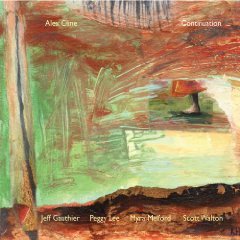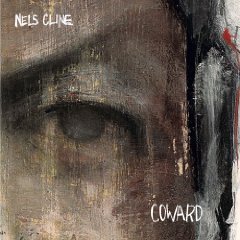Alex Cline, “Continuation” (Cryptogramophone)
Alex Cline is one of the few musicians who can triumph over his own calm and discipline to make involving music.
Not that peace inherently sucks; it’s just boring. Many Buddhistic artists think that because they can reach the still point, their offerings have gotta be motionless. Alex doesn’t make that mistake; he’s a communicator. His meditations are revolving worlds of color and vibration, places you can fall into and keep tumbling till you get dizzy, lose yourself, merge.
A drummer and a percussionist, Alex likes to start with gongs, as he does on “Nourishing Our Roots.” Sure, he stole the idea from Black Sabbath’s church bells, but it’s a good choice -- no other instrument expresses the same combination of impact, continuation and, as its overtones die out, spatial movement. A close second might be Myra Melford’s harmonium, which closes the track with a limitless drone as Alex plucks after-the-rain drips on kantele, a kind of zither. In between, the cello and violin of Peggy Lee and Jeff Gauthier extend gently expressive melodic threads, Scott Walton’s bass lays out the barest of frameworks, and Alex constantly spangles superdelicate spatters, ticks and dings around his drum kit.
Most of the album has that open, varitextured feel, exemplified in different ways by the two 18-minute compositions that weight the second half. “SubMerge,” with its extremely spacious gamelan-like palette, harbors a lot of drama: little bell cymbals that vibrate your sinuses, blossoming gongs, Tarkovskyan expanding nebulae, hiatuses terminated with heavy concussions like the “Da” moments in T.S. Eliot’s “The Waste Land.” Sudden pauses also punctuate “On the Bones of the Homegoing Thunder” (a Thomas Merton line) after it permits itself a Cecil Taylorish introductory hustle with Melford on piano and a bowed Walton solo as rich and thick as a mound of molé; its eerie cat-paw piano, bass walk and violin drone make for a really original, inward-drawing end.
Wondrous as these are, I dig the groove numbers most. The sliding bass and wheezing harmonium of “Clearing Our Streams” carry a whiff of India as Alex builds a fat, dark rhythm on the low toms and the strings intertwine in a DNA dance. And Alex’s earlier “Interstellar Space” duets with brother Nels Cline have laid great groundwork for the Coltranean “Steadfast,” with its Afro bass bump, its free-praise sections and a thoughtfully defined circular piano solo from Melford -- quietly passionate stuff.
Alex Cline doesn’t just let you hear the essence of an instrument or a tone or spirit visitation, he MAKES you hear them. Because he’s not jamming; he’s got something specific to say, and he says it with care. You also get in-yer-ear recording by Rich Breen, superb pix of the band by Anne Fishbein, and warm semiabstract paintings by Karen Hamilton, all in a beautiful Alex-designed package. A.C. calls this a “dream project”: lucky for us, he didn’t wake for the duration.
Nels Cline, “Coward” (Cryptogramophone)
You’ve never heard anything like this. Guitarist Nels Cline had an entire 72-minute album in his head -- deep in layers, textures, original harmonic thinking. And he played it all himself, on over a dozen kinds of stringed instrument.
Nobody else could’ve helped, because the ideas and emotions belong so peculiarly to Nels. There’s a lot of pain here -- pain of separation, pain of death -- and a lot of beauty, which is one way of dealing with pain. Where in the past Nels might have raged and twisted with amps cranked, he now chooses to lay out his complexities on mostly acoustic instruments, so you can clearly discern, thanks to a sympathetic recording with Mark Wheaton, the way all the elements interrelate. Many of his chords, strummed or separately harmonized, can’t be found in any manual; the way some of them combine unusual intervals with primal sweetness makes me guess they take a page from the book of microtonal guitarist Rod Poole, who was killed in 2007 and to whom the record’s longest track is dedicated.
The compositions are well plotted yet relaxed, effortlessly morphing among multiple segments and multiple root materials. After opening with a sleep-breathing sustain that could’ve been a loop of Nico’s harmonium, Nels visits trancy arpeggios, thereminlike sci-fi, country steel, rock urgency, the Renaissance, the court of the Chinese emperor . . . not for the sake of eclecticism, but just because it’s all part of his singular voice. (Though calling one of his groups the Nels Cline Singers may have been a confusing career move, the name makes its own sense.)
The six-part suite “Onan,” with its recurrent nuclear rumbles, contains the record’s most immediate statements: the psychedelic future-reggae sex-slop loop “Seedcaster” and the dervish dance “The Liberator.” Nels may have included no intelligible words on this album, but his titles can be subtle. On one hand, the biblical Onan was the patriarch of masturbatory (yet excellent) music like this. On the other hand, Onan incurred God’s wrath by refusing to procreate according to order. (Genesis 38:8-10.)
Any true artist does the same -- even if he pays, as Onan did, with his life.


